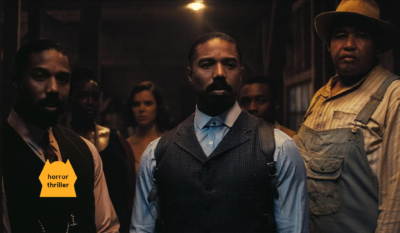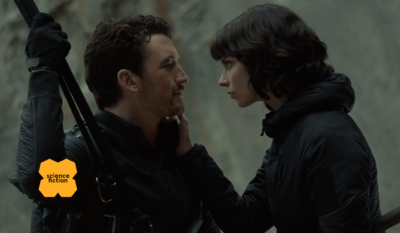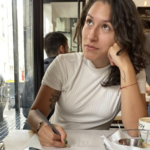Aftersun follows the childhood memory of a girl on vacation with her father to the Turkish coast. But where there's sun there is also shadow.


Aftersun is one of the greatest depictions of depression and grief captured on film as it meditates on childhood, parenthood, and memory. Beautifully wrought with cinematography and score that play like a memory on loop. As the movie comes to its stunningly satisfying and emotional conclusion—perhaps one of the greatest final moments of a movie I've seen in some time—we're taught that opening that box might be a means to an end. A means to heal the burn that memories can leave.
You might also like: Past Lives, The Worst Person in the World

Do you know that lethargic feeling after sitting in the sun on a hot summer day? Or the melancholic daze that follows you home after a perfect vacation? Do you get blotches in your vision after looking into a bright light or staring up at the sun? All those sensations perfectly described Charlotte Wells' debut feature Aftersun, which feels like the perfect term to encapsulate each of those feelings. And that is what the whole movie is: a feeling. For its largely plotless 96-minute runtime nothing really happens in front of you. But rest assured, there's plenty happening in the shadows of the sunny father-daughter beach holiday at the center of the movie.
💌 Get weekly streaming movie
recommendations in your inbox
Wells presents Aftersun as a childhood memory flashing into the mind of a girl 20 years later—when she's the same age as her father at the time. But as with any memory, things look different in retrospect.
In the early 90s, young father Calum (Normal People's Paul Mescal) brings his 11-year-old daughter Sophie (played as a child by Francesca Corio, a real festival breakout) on a sleepy summer vacation on the Turkish coast. Gregory Oke's dreamy cinematography simultaneously underlines the sunny haziness of a beachy summer and the soft edges of memory. In between days lounging at the pool, trips to the resort's restaurant, and interactions with the other guests, we see interstitial clips from home video of the trip filmed by either Sophie or Calum. It's in those clips—and interruptions often taking place at night while Sophie is asleep—that we sense there's more meaning and heaviness in this vacation for Calum.
Those feelings only come in waves though. We never see Calum being less than a devoted (and goofy) father to Sophie, almost a complete juxtaposition to the view we have of the usual young parent—sometimes he's even mistaken for her brother. Sophie, as a child, sees him as nothing less than an invincible infallible hero—how many of us see our parents. Her childlike wonder extends to the world around her as she becomes enamored with a group of older kids—a bit of a nod to the typical coming-of-age story, of which Aftersun is decidedly not. However, that wonder also leads to conflict when Sophie's frank questions lead to revealing that not all is great and perfect in the background of Calum's life. At the moment, she thinks nothing of them. However, when adult Sophie looks back at the same clips we're watching, they play very differently. Like videos taken before a coming disaster.
ADVERTISEMENT

Memories always have their blind spots. You remember the bright moments while blocking out the darker ones. It's not until you look back and unpack them as an adult that you see their profundity.
31-year-old Sophie (Celia Rowlson-Hall), who we cut to for short moments throughout the movie, is the same age as her father when they went on that vacation. As she remembers the bright spots—the late night karaoke, her first kiss, her dad clumsily juggling bread rolls at dinner—the darker ones slip in as well. Or, at the very least, she fills them in—her dad crying in the middle of the night, his quiet swaying while smoking a cigarette on the balcony, his muffled contentious phone calls back home. However, the movie never lingers on those moments—like adult Sophie is trying to keep them out of her perfect vision of that summer vacation. The same way that we exclude the awkward pauses at an otherwise lovely dinner or the arguments heard through walls late at night after you went to bed in our memories. You keep the good and avoid the bad until you can no longer stand the weight of the past.
It's difficult to describe Aftersun because nothing and everything is happening at the same time. Though what's happening on screen may seem mundane, it's drenched in subtext. For those that aren't looking in the right places, the movie might be tedious to get through.
ADVERTISEMENT
Aftersun is about many things, but at its core it's about the blindspots of our memories and traumas—and how we fill them in to make them whole again.
Our parents try to create the best childhood for us. Short of that, they at least try to create the best version of those memories for you, whether intentionally or unintentionally. It's why nostalgia exists and why some memories float to the surface while others burrow themselves deep into our psyches. Charlotte Wells uses Aftersun to show us what it's like to unlock that box that we all keep away in a hidden dark corner of our minds. What it's like to admit that our perfect childhood memories are just afterimages of the brightest moments. As the movie comes to its stunningly satisfying and emotional conclusion fittingly underscored by Queen's “Under Pressure”—perhaps one of the greatest final moments of a movie I've seen in some time—we're taught that opening that box might be a means to an end. A means to heal the burn that memories can leave.
ADVERTISEMENT
More movies, less problems
- Jordan Peele Unleashes the First Trailer for ‘HIM'
- ‘Sinners' is the best movie of the year | movie review
- Romantic sci-fi thriller ‘The Gorge' hits its mark | movie reivew
Hey! I'm Karl. You can find me on Twitter and Letterboxd. I'm also a Tomatometer-approved critic.
💌 Sign up for our weekly email newsletter with movie recommendations available to stream.
ADVERTISEMENT


